A domestic appliance break-down is an unwelcome event that will hit every home from time to time. When it comes to can’t-live-without appliances like cookers, fridges and washing machines, you’ll be wondering if it’s cheaper to repair or replace.
Is your appliance safe to use?
It’s not always possible to manage the costs and admin involved in sorting out a broken appliance and you may be tempted to soldier on with a non-working fridge light or an oven that takes a very long time to heat up. But you do need to consider safety, as well as money and time.
Gas appliances that are not working always need to be checked out by an engineer, otherwise you risk a gas leak or carbon monoxide poisoning.
Appliances that give even small electric shocks are not safe to use. Unplug them, and do not use again until an engineer has taken a look.
Fridges and freezers that do not maintain a low enough temperature can put your family at risk from food poisoning. So be cautious until you get your faulty fridge repaired or replaced.
How do I decide whether to repair or replace white goods?
These are some questions to consider when deciding whether to replace a domestic appliance.
- How long have you had the appliance?
- How easy is it to replace the appliance?
- Is the repair more expensive than the replacement?
How long have you had the appliance?
The age of your broken appliance will figure as you decide whether to repair or get a new one.
Most appliances come with a warranty. If your appliance fails within the warranty period, the manufacturer will repair or replace it. The warranty can give an idea of how long the manufacturer expects the appliance to last – but many appliances outlast their warranty, particularly if they are carefully maintained.
According to Magnet, which has researched the lifespan of appliances, you can expect a fridge to last ten years, while a microwave may last nine years. A gas cooker lasts on average 15 years, while an electric cooker lasts 13.
How easy is it to replace your appliance?
Built-in appliances or appliances with custom finishes or features will be more expensive to replace on a like-for-like basis. So you may be willing to pay more for a repair to these.
Is the repair more expensive than the appliance?
The only way to make this decision is to do some research. It’s notoriously difficult for engineers to diagnose appliance faults without a visit, but try to get some idea of how much the repair and spare parts might cost by getting quotes.
Then do your research on the costs of replacing the appliance. Consumer guides like Which? are your friend here.
Help with deciding whether to repair or replace specific appliances
We have some blogposts with advice to help you decide whether to repair or replace specific appliances.
- Should I repair or replace my oven?
- Should I repair or replace my fridge?
- Should I repair or replace my washing machine?
Is it worth storing a domestic appliance that is not in use?
Cheaper domestic appliances are probably not worth storing unless they are relatively new and you know that you will be bringing them back into use within the next six months. Stored domestic appliances like fridges, ovens and cookers will all be covered by your Store and Insure self-storage insurance policy.




